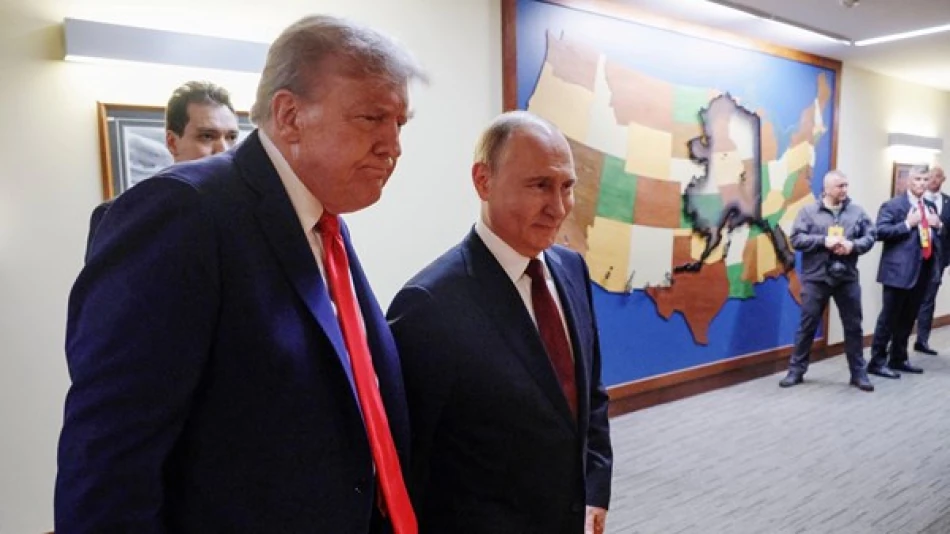
Putin Demands Ukraine's Withdrawal from Donetsk at Alaska Summit
Putin Demands Ukrainian Withdrawal from Donetsk as Peace Condition, Trump Pushes for Swift Deal
Russian President Vladimir Putin has reportedly offered to freeze most frontlines in Ukraine in exchange for complete Ukrainian withdrawal from the strategic Donetsk region, according to discussions with Donald Trump. The proposal, which Ukrainian President Volodymyr Zelensky firmly rejected during a 90-minute call with Trump, highlights the stark divide between territorial concessions and sovereignty that may define upcoming peace negotiations.
The Alaska Meeting: Putin's Strategic Gambit
According to four sources familiar with the matter, Putin presented his conditions during a Friday meeting with Trump in Alaska. The Russian leader proposed freezing combat lines in the southern regions of Kherson and Zaporizhzhia while demanding full control over Donetsk—one of Ukraine's most industrially valuable territories.
The timing of this proposal is significant. Donetsk region contains substantial coal reserves, steel production facilities, and critical infrastructure that have made it a focal point of the conflict since 2014. By offering to freeze other frontlines while insisting on Donetsk, Putin appears to be prioritizing economic and strategic assets over pure territorial expansion.
Trump's Pressure Campaign Meets Ukrainian Resistance
Trump's subsequent phone call with Zelensky revealed the new administration's apparent eagerness for a rapid resolution. Sources described Trump's approach as seeking "a quick deal at any cost," a strategy that could reshape America's role in the conflict.
Zelensky's flat rejection—reportedly stating such concessions were "impossible"—underscores Ukraine's consistent position that territorial integrity remains non-negotiable. This stance has remained unchanged despite nearly three years of warfare and shifting international support.
Historical Precedent and Strategic Implications
Putin's proposal echoes the frozen conflict model Russia has employed in Georgia's South Ossetia and Abkhazia since 2008, and initially in eastern Ukraine from 2014-2022. These arrangements typically favor Moscow by creating de facto Russian control while maintaining plausible deniability about formal annexation.
However, the scale differs dramatically. Donetsk region alone represents approximately 4% of Ukraine's total territory and contains infrastructure worth tens of billions of dollars. Unlike smaller separatist territories, losing Donetsk would fundamentally alter Ukraine's economic future.
Economic and Geopolitical Stakes
For global markets, the proposal signals potential stabilization of energy supplies and reduced sanctions pressure—factors that could influence European energy prices and Russian commodity exports. However, any deal that rewards territorial conquest through force could set precedents affecting other disputed regions worldwide.
Trump's characterization of Russia as "a very big power" while suggesting Ukraine "is not" reflects a realpolitik approach that prioritizes power dynamics over international law. This represents a significant shift from the Biden administration's emphasis on territorial sovereignty and could influence how other nations approach territorial disputes.
The Negotiation Deadlock
The current positions appear irreconcilable. Putin's demand for Donetsk withdrawal goes beyond freezing current lines—it requires Ukraine to abandon territory it still partially controls. Meanwhile, Zelensky's rejection reflects both domestic political reality and the principle that conceding territory under military pressure invites further aggression.
The involvement of Trump as intermediary adds complexity, as his administration's apparent preference for rapid resolution may not align with either party's core objectives. Putin seeks permanent territorial gains, while Zelensky requires security guarantees that prevent future Russian advances.
This fundamental mismatch suggests that despite high-profile diplomatic engagement, the path to sustainable peace remains elusive. Any eventual agreement will likely require more sophisticated frameworks than simple territorial swaps—potentially involving security guarantees, reconstruction funding, and mechanisms to prevent renewed conflict.
Most Viewed News

 Layla Al Mansoori
Layla Al Mansoori






